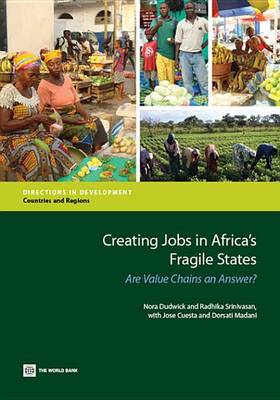Directions in Development, Countries and Regions
2 total works
From Farm to Firm
by Nora Dudwick, Katy Hull, Roy Katayama, Forhad Shilpi, and Kenneth Simler
Published 26 May 2011
The process of rural-urban transformation presents both opportunities and challenges for development. If managed effectively, it can result in growth that benefits everyone; if managed poorly, it can lead to stark welfare disparities and entire regions cut off from the advantages of agglomeration economies. The importance of rural-urban transition has been confirmed by two consecutive World Development Reports: WDR 2008 Agriculture for Development; and WDR 2009 Reshaping Economic Geography. Focusing on Sub-Saharan Africa and South Asia, this book picks up where the WDRs left off, investigating the influence of country conditions and policies on the pace, pattern, and consequences of rural-urban transition and suggesting strategies to ensure that its benefits results in shared improvements in well-being.
The book uncovers vast inequalities, whether between two regions of one country, between rural and urban areas, or within cities themselves. The authors find little evidence to suggest that these inequalities will automatically diminish as countries develop: empirical and qualitative analysis suggests that spatial divides are mainly a function of country conditions, policies and institutions. By implication, policymakers must take active steps to ensure that rural-urban transition results in shared growth. Spatially unbiased provision of health and education services is crucial to ensuring that the benefits of transition are shared by all. But connective infrastructure and targeted interventions also emerge as important considerations, even in countries with severely constrained fiscal and administrative capacity. The authors suggest steps for navigating the tricky political economy of land reforms. And they alert readers to potential spillover effects that mean that policies designed for one space can have unintended consequences on another.
Policymakers and development experts, as well as anyone concerned with the impact of rural-urban transition on growth and equity, will find this book a thought-provoking and informative read.
The book uncovers vast inequalities, whether between two regions of one country, between rural and urban areas, or within cities themselves. The authors find little evidence to suggest that these inequalities will automatically diminish as countries develop: empirical and qualitative analysis suggests that spatial divides are mainly a function of country conditions, policies and institutions. By implication, policymakers must take active steps to ensure that rural-urban transition results in shared growth. Spatially unbiased provision of health and education services is crucial to ensuring that the benefits of transition are shared by all. But connective infrastructure and targeted interventions also emerge as important considerations, even in countries with severely constrained fiscal and administrative capacity. The authors suggest steps for navigating the tricky political economy of land reforms. And they alert readers to potential spillover effects that mean that policies designed for one space can have unintended consequences on another.
Policymakers and development experts, as well as anyone concerned with the impact of rural-urban transition on growth and equity, will find this book a thought-provoking and informative read.
Creating Jobs in Africa's Fragile States
by Nora Dudwick and Radhika Srinivasan
Published 30 June 2013
Nowhere is the need to generate employment more urgent than in the fragile states of Sub-Saharan Africa. In this region, where the majority of the labor force still works in agriculture, the potential of agricultural value chain development has been underexploited. Because value chain development lends itself to a flexible and incremental approach, it appears to be feasible in the absence of well-functioning government institutions. As value chain development involves building and strengthening relationships along the chain of productive and value-adding activities, it also has the potential to restore social relationships eroded by conflict. Creating Jobs in Africa's Fragile States considers how fragility has affected economic development and job creation in Sub-Saharan Africa and how the World Bank and other donors have addressed job creation in fragile and conflict-affected environments. It examines value chain projects that have proved successful in Sub-Saharan Africa and other fragile environments. This book is primarily addressed to donors, nongovernmental organizations and policy makers, all of whom have a unique role to play in nurturing value chains. For the World Bank, increased collaboration across the institution, rather than a strictly sectoral approach, has the potential to catalyze value chain development and expand job opportunities in Africa.

